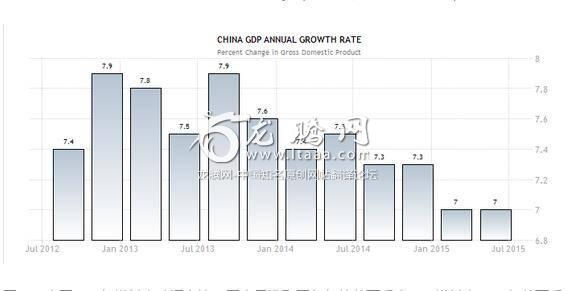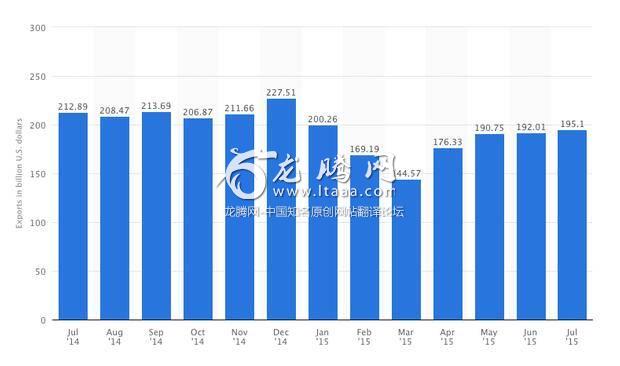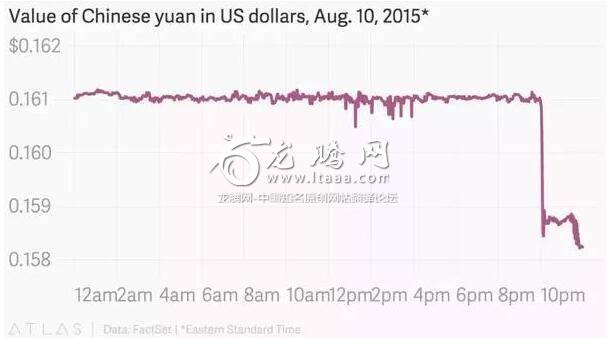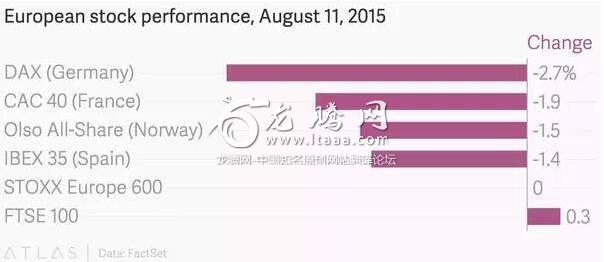8.11汇改:为什么央行允许人民币贬值?人民币贬值有何影响 [美国媒体]
quora网友:人民币贬值意味着什么?这意味着如果之前一位美国公民可以用1美元换5元人民币,现在1美元则可以换8元人民币,从而你可以购买更多的产品。你可以把货币贬值看作是一种另类的促销。中国的向国外出售商品和服务的企业,是以人民币报价的。因此,如果人民币相对于美元贬值......
Why did the People''s Bank of China due China''s currency (the yuan/renminbi)?
8.11汇改:为什么央行允许人民币贬值?人民币贬值有何影响
【回答一】
Dhaval Sampat, In knowledge acquisition mode.
Answered Aug 23, 2015
The Chinese government duing their currency Yuan by around 4% against the Dollar sent shivers across the world market.
中国政府将人民币兑美元贬值了4%,这让世界市场不寒而栗。
What does the Chinese currency duation mean?
This means earlier if as a US citizen 1$ could get you 5RMB, now 1$ may get you 8 RMB,thereby allowing you to buy more products. You can think of currency duation as a kind of a sale. Businesses in China that sell goods and services to customers in foreign countries have them priced in China's own currency, the yuan. So if the yuan becomes less valuable relative to the dollar/any foreign currency, Chinese products suddenly become cheaper and more attractive in US/any foreign country.
人民币贬值意味着什么?
这意味着如果之前一位美国公民可以用1美元换5元人民币,现在1美元则可以换8元人民币,从而你可以购买更多的产品。你可以把货币贬值看作是一种另类的促销。中国的向国外出售商品和服务的企业,是以人民币报价的。因此,如果人民币相对于美元贬值,那么中国产品对于美国或者任何其他国家,都会突然变得更便宜,更有吸引力。
Reasons China may have done this:
i) Slowest growth rate in the last 5 years:
The Chinese economy recorded the 7% growth rate in the 2nd quarter. (the slowest in the last five years)
中国这样做的原因
1)过去五年来最低的经济增长率
中国经济在2015年第二季度实现了7%的增长。(这是过去五年中最慢的)
图一:中国GDP年增长率(译者注:图中只选取了每年的前两季度GDP增长率。15年前两季度均为7%,低于往年同期)
ii) Slow-down seen in the Chinese exports:
2)出口额的下滑
图二:中国出口额(译者注:单位是十亿美元,数据是月度数据,可以看出15年1月开始出口额骤降270亿美元,之后一降再降,最后虽有所反弹,但仍不如16年)
Duation would reduce the prices of Chinese products in the world market. Just as sales help a store sell more products, a currency duation would help countries boost their exports.
人民币贬值会降低中国商品在世界市场上的价格。就跟商场减价促销一样,货币贬值会促进一个国家的出口。
iii) China’s movement towards a floating exchange rate:
Most developed countries, including the US, allow the market supply and demand to determine the dollar value. That is not the case with China. Until 2005, the government kept its currency pegged to the dollar, with the central bank buying or selling currency as necessary to ensure that 1$ was worth around 8.2 ¥.
Since 2005, the currency has been pegged to a basket of currencies, and the exchange rate has changed over time but China still actively manages the currency's value on a day-to-day basis.
3)中国向浮动式汇率迈进
包括美国在内的大多数发达国家,都允许由市场供求关系来决定美元的价值。在中国却不是这样。在2005年以前,政府一直将人民币与美元挂钩,央行在必要时买入或卖出货币,确保1美元兑换8.2元人民币。
自2005年以来,人民币开始盯住一篮子货币,人民币汇率随着时间的推移也发生了变化,但中国仍然积极地调控人民币的日常汇率。
iv) Enhance Yuan's stature and improve China’s standing
China desires to have Yuan included in IMF's so-called Special Drawing Right's basket so that it gets an enhanced stature and be treated as an elite currency along the likes of the dollar, the euro and the yen. The I.M.F. last week deferred that particular seal of approval, deciding not to include it.
4)提高人民币的地位,改善中国的状况
中国希望将人民币纳入IMF所谓的“特别提款权”货币篮子,使其获得更高的地位,并且同美元、欧元和日元等货币一样,被视为精英货币。但是上周,国际货币基金组织推迟了这一批准,决定不将人民币其纳入其中。
v) Currency Manipulation at work
Many also accuse China of trying to gain an unfair trade advantage over America though “currency manipulation” – just as the US is negotiating the important Trans-Pacific Partnership trade agreement with a number of China’s rivals, including Japan.
5)有货币操纵之嫌
许多人还指责中国试图通过“汇率操纵”,来获得不公平的对美国的贸易优势——因此美国正在与包括日本在内的诸多中国的竞争对手,谈判协商具有重要意义的跨太平洋伙伴关系贸易协定(TPP)。
Impact on the World Economy:
Harm businesses in other countries:
A cheap yuan gives Chinese exporters an advantage in world markets, which can harm businesses in other countries.
Currency Wars:
Since it will make Chinese exports more competitive and exports from other countries uncompetitive . This would lead to other countries also due their currency leading to a currency war .
Deflationary tendencies:
Some countries which have not dued may experience deflationary tendencies in turn slowing down economic growth in the country and inturn the world. Countries importing goods from China would be a victim of this direct deflationary effect.
对世界经济的影响:
伤害其他国家的企业:廉价的人民币让中国出口商在世界市场上占有优势,这可能会损害其他国家的企业。
货币战争:因为这将使中国的出口更具竞争力,而其他国家的出口也没有竞争力。这将导致其他国家也贬值本币,从而引发一场货币战争。
通货紧缩的倾向:一些没有贬值的国家可能会有通货紧缩(译者注:本国不贬值,那么本币会升值,国内商品价格相对而言也就下降了,即通货紧缩)的趋势,反过来又会阻碍这个国家的经济增长和世界的发展。从中国进口商品的国家将直接成为这种通缩效应的受害者。
To summarize, if Beijing allows the Yuan to decline further in coming months, it could increase trade tensions, or even a “currency war”, in which the world’s biggies face off in a beggar-thy-neighbour battle to seize the largest possible share of global consumer demand.
Beggar thy neighbour - an international trading policy that got its name from making a beggar out of your neighbour by utilizing currency duations and protective barriers to alleviate a nation's economic difficulties at the expense of other countries. While the policy may help repair an economic hardship in the nation but it will harm the country's trading partners.
Hope this helps. Would love to know your thoughts.
总而言之,如果北京允许人民币币值在未来几个月进一步下跌,可能会加剧贸易摩擦,甚至可能引发一场“货币战争”,在这场战争中,世界上的大国将在以邻为壑的争斗中,争夺全球消费市场尽可能大的份额。
以邻为壑效应——一种国际贸易政策,它利用货币贬值和保护壁垒,以牺牲其他国家的利益来缓解一个国家的经济困境。尽管这一政策可能有助于修复美国的经济困境,但这将损害该国的贸易伙伴。
希望这些会有所帮助。很乐意听听大家的想法。
————————————————————
【回答二】
Samuel Liu
Aug 23, 2015
Less than 5% duation over 10days. If that is a threat those countries are definitely fragile.
I read that the current Japanese administration dued over 30%.
10天才贬值了5%,如果这都能威胁到那些国家,那么它们也太脆弱了。
而我看到,当前日本政府把日元贬值了30%。
————————————————————
【回答三】
Gonzalo Camina Ceballos, CEO at OpSeeker (2016-present)
Answered Aug 26, 2015
The problem with China duation is not the duation per se, but what this duation entails. China is starting to run out of bullets to encourage the growth of an economy that its starting to slowdown at quite a high pace. This is why they are force to take a measurement that, in theory boosts growth.
人民币贬值的问题不是货币贬值本身,而是人民币贬值带来的后果。在促进经济增长方面,中国已经黔驴技穷了,并且中国经济增长率,现在正以非常快的速度下降。这也是为什么他们被迫采取,在理论上可以促进经济增长的方法(人民币贬值)。
Why do currency wars exist?
Let’s use this point to get some macroeconomics concepts clear in our heads. We all know what GDP is, but how do we get to that number? There are three ways:
为什么会有货币战争?
通过这次机会,让我们来回顾一些宏观经济学概念。我们都知道GDP是多少,但是我们如何计算GDP的呢?有三种方法:
1 Production Approach – The GDP is calculated as the gross value of all domestic output for all the economic activities minus the intermediate consumption which are the cost of materials, products, and services used in the production of final goods or services.
2 Income Approach – Known by another name, GDI, the GDP given by the income approach should match the one given by the Production Approach. In this second way we need to add the following 4 factors.
1)Retributions to business’ workers
2)Corporate Profits
3)Investment income
4x)Unincorporated businesses’ income
To these 4 factors we need to add the indirect taxes minus subsidies, and depreciation.
3Expenditure Approach – This is the approach that we are going to use to explain why currency duation is a tool to improve GDP growth, at least in theory. In this third approach we add all the uses of goods and services that are final by adding all the final expenditures in the economy. In this approach GDP is known as Y and it is the sum of consumption (C), Investment (I), government spending (G), and net exports à Exports – Imports (X-M)
Y = C + I + G + (X-M)
1 产出法——GDP是指所有经济活动产生的国内产出的总价值减去中间耗费,即生产最终产品和服务过程中所用的材料、产品和服务的成本。
2收入法——GDP(国内生产总值)又叫做GDI(国内收入总值),收入法得出的GDP应该与生产法所得出的GDP相同。在收入法中,我们需要将以下4个因素相加。1)工人工资,2)企业利润,3)投资收入,4)非公司私人企业的收入。除此之外还要加上间接税,减去政府补贴和折旧。
3支出法——这种方法是我们将用来解释,为什么货币贬值有利于促进GDP增长。至少在理论上是这样。在这种方法中,我们通过加总经济中的所有的最终支出,来得到所有最终的商品和服务的消费情况。其中,GDP被称为Y,它是消费(C)、投资(I)、政府支出(G)和净出口的总和(X-M)
即GDP=消费+投资+政府支出+净出口(出口减去进口)
In an economy where consumption and investment are stagnant and low, and where the government doesn’t have the ability to inject more money, the easiest and fastest way to affect the GDP growth would be to modify the net exports number. Exchange rates have the answer! If the country that is experiencing the above-mentioned situation exports a significant amount of goods and services it could due its currency in order to improve its GDP. This duation would have an almost immediate effect in the GDP growth rate since the domestic products would be way more attractive in foreign countries and the foreign products would be less attractive in the domestic region.
在一个消费和投资低迷、政府没法向社会注入更多资金的经济体中,影响GDP增长的,最简便快捷的方式就是调整净出口数字(译者注:GDP=C+I+G+净出口,消费是C,投资是I,政府指出是G,按照答主的说法,中国的C,I,G都不行,只能调整净出口从而增加GDP)。汇率很关键!如果正在经历上述情况的国家,对外出口大量的商品和服务,它就可以通过货币贬值,来增加其国内生产总值。这种贬值将对GDP增长产生立竿见影的效果,因为贬值后国内产品在国外会更有吸引力,而外国产品在国内的吸引力将会降低。(译者注:货币贬值后,本国商品更便宜,外国商品更贵了)
Duation is a tool that shows desperation and that can provoke major unrest in the EM as we are seeing.
The problem of competitive duation is that no country will benefit from the duation since at the end all the currencies remain at a similar level after all the duations have taken place. This could result in countries using protectionist measures, such as tariffs or subsidies, in order to promote domestic consumption and exports. This results in a drop in international trade and a loss of output for the entire economy.
货币贬值是一种走投无路的选项,它可能会引发现在正在发生的,新兴市场的重大动荡。
竞争性贬值的问题在于,没有哪个国家会从货币贬值中受益,因为所有货币都贬值之后,所有货币相对价格仍保持在,跟以前类似的水平。但这可能导致各国采取保护主义措施,例如征收关税或提供补贴,以促进国内消费和出口。这导致了国际贸易额的下降和整个经济体产出的下降。
————————————————————
【回答四】
John Carter
As pressures from the US, Japan, and some European countries mount on China to rue its currency, currency traders and speculators moved substantial funds to China to generate quick profits in anticipation of Chinese Government decision to rue its Currency, the yuan. Currency traders are so confident that China will ruate its currency that the value of the yuan in the futures market is 4.5% higher than its current FIXED exchange rate!
随着来自美国、日本和一些欧洲国家施加的压力越来越大,这迫使中国将重新评估人民币汇率,外汇交易员和投机者将大量资金转移到中国,期望迅速获利,因为他们预计中国政府将决定让人民币升值。外汇交易员非常有信心,认为中国肯定会重新评估人民币的价值,以至于人民币在期货市场的价值比当前的固定汇率高出4.5%!
————————————————————
【回答五】
Naveen Singh, Startup Enthusiast
Answered Sep 13, 2015
China jostled the world markets by a series of moves to due its tightly controlled currency on Aug 11 allowing the yuan’s biggest one day decline in a decade. Being the second largest economy, this was surely a big news for financial markets and other countries all over the world.
8月11日,中国采取了一系列措施,使得一直被其牢牢管控的人民币贬值,创下了人民币10年内最大单日跌幅,吸引力全世界的目光。作为世界第二大经济体,这对全球金融市场和其他国家来说无疑是个大新闻。
图三:人民币兑美元的汇率(译者注:从图中可以看出,汇率从一元人民币兑0.161美元,跌到一元人民币兑0.158美元左右)
China uses managed floating exchange rate system and allows the yuan to fluctuate within a band of 2 percent above or below a certain point set by the People’s Bank of China based on the previous day trading. This prevents wide swings in the currency that might hurt the economy. Thus, the PBC(People’s Bank of China)influences the yuan exchange rate by buying or selling its currency. This is different from other major economies, where currencies like US dollar and euro are freely traded.
中国采用有管理的浮动汇率制度,允许人民币汇率在中国人民银行设定的某一汇率值附近,上下浮动2个百分点。这就阻止了货币的大幅波动,但也可能会损害经济。因此,中国人民银行通过购买或出售人民币来影响人民币汇率。这与其他主要经济体不同,在这些经济体中,美元和欧元等货币是自由交易的。
Why?
China’s growth has been slowing and the world is fretting over it. Its exports have fallen for straight eight months by 8.3% in June. Chinese authorities have been struggling to shift to a consumption driven economy from exports-driven and in turn has been trying to achieve the ‘new normal’ level of growth.
The Chinese yuan has been rising in value for more than a decade during which country’s economy also grew. However, currencies of other major competitors have fallen in this period which has made Chinese exports less competitive.
Thus, China has also been accused of duing its currency to get a competitive advantage for its exports to boost the growth. People all over the world are scared that this might start the currency war in which other countries will also due its currency to increase their exports.
为什么要贬值?
中国的经济增长一直在放缓,世界也在为此担忧。6月份,中国的出口增长率连续第8个月下滑,同比下降8.3%。中国当局一直在努力,将中国由出口驱动型经济转向消费驱动型经济,并且反过来,又一直在努力维持这种“新常态”的增长水平。
在中国经济增长的十多年里,人民币的价值也一直在上升。然而,在这段时间里,其他主要竞争对手的货币却发生贬值,这使得中国的出口竞争力下降。
因此,中国也被指责,通过人民币贬值以获得出口竞争优势,从而促进经济增长。世界各地的人们都担心,这可能引发一场货币战争,因为其他国家也会让本国货币贬值以增加出口。
China's Stand
Chinese’e leadership has been trying to internationalize its currency and it wants yuan’s inclusion in International Monetary Fund’s special drawing rights (SDRs). SDR is basically a reserve of foreign currency assets created by International Monetary Fund and its basket comprises US dollar, euro, pound and Japanese yen. But for that to happen, yuan need to be fairly and freely valued by the markets.
In a official statement released on its website, the central bank has said this step is in accordance with making yuan more market-friendly and markets will now play a bigger role in determining the exchange rate. The decision was welcomed by IMF which saw it as step forward in china’s aim of freely floatable currency.
中国的立场
中国领导层一直在努力推动人民币国际化,并希望人民币被纳入国际货币基金组织的特别提款权(SDR)货币篮子里。SDR基本上是由国际货币基金组织创建的外汇资产储备,其货币篮子包括美元、欧元、英镑和日元。但要实现这一目标,人民币需要由市场公平自由的来确定其价值。
中国央行在其网站上发布的一份官方声明中表示,这一举措是为了让人民币进一步市场化,市场现在将在决定人民币汇率方面发挥更大的作用。这一决定受到了国际货币基金组织的欢迎,他们认为中国向自由浮动式汇率迈进了一步。
Markets's Reaction
The impact of yuan duation was seen around the world with many currencies losing as much as 20%.The commodities markets was also hit because china is the biggest consumer of raw materials.
China is one of the biggest markets for European exports and duing yuan would make any import into China more expensive.Thus, the European markets were hurt badly.
市场的反应
人民币贬值的影响在全世界随处可见,许多货币贬值超过20%。大宗商品市场也受到重创,因为中国是原材料最大的消费国。
中国是欧洲最大的出口对象之一,人民币贬值将使任何进口商品都更加昂贵(译者注:从而中国进口下降)。因此,欧洲市场将严重受损。
图四:2015年8月11日欧洲股票市场指数(译者注:从图中可以看出,德国,法国,挪威,西班牙等国家股市指数均下跌超过1%)
————————————————————
【回答六】
Craig Butcher
Answered Aug 24, 2015
Very simply-- a bit oversimply perhaps-- mostly for the same reason other countries do. It starts when you try to goose up your exports by making your exchange rate more favorable to importers than the exchange rate of competitor countries. Of course the competitors want to do the same thing so what you almost invariably wind up just trying to hack your exchange rates to prevent your neighbor country's duation from having its desired effect at raising their exports at your expense. In a sense it's like a fistfight where everyone punches themselves in the nose because that way it hurts less than when someone else punches you in the nose...
很简单——甚至有点过于简单——中国跟其他国家一样,几乎都是出于同样的原因。当你试图通过让你的汇率更有利于进口商而不是竞争对手的汇率来刺激出口时,它就开始了。当然,竞争对手也想做同样的事情,所以你几乎无一例外地试图侵入你的汇率,以防止你的邻国贬值,以牺牲你的利益来提高出口。从某种意义上说,这就像一场拳打,每个人都打自己的鼻子,因为那样会比别人打你鼻子的时候更疼。
The reasoning is: your country makes underwear and America doesn't because you make underwear much cheaper than American companies can make it in American factories. You sell the Americans so much underwear that they buy way more underwear than they sell you of whatever it is if anything they make. So over time they wind up essentially borrowing your currency to pay you for all that underwear. To get more and more of your currency they have to borrow more and more. Effectively this means the demand for your currency goes up. When the demand for something goes up so does its price.
理由很简单:你的国家生产内衣而美国不生产,因为你的生产成本比美国公司在美国工厂生产要便宜得多。你卖给美国人太多的内衣,以至于他们购买你的内衣,比他们卖给你的任何东西都要多得多。所以随着时间的推移,他们最终会借你的钱来,来为购买的所有内衣付账。为了获得越来越多的你国货币,他们必须找你借更多的钱。实际上,这意味着对你的货币的需求上升。当对某物的需求上升时,它的价格也会上涨。(译者注:汇率在某种程度上,可以看作货币的“价格”)
But if the price of your currency goes up then so does the price of the underwear. If it goes up enough then the Americans may find it becomes cheaper now to buy currency of other countries which also sell underwear. So they stop buying so much underwear from you. So now your underwear makers don't have the market they did and they start shutting down factories. And now people are out of work are very unhappy with you. So maybe you don't even want for that to happen. You due your currency proactively. Because your neighbor is doing the same thing anyway and if you don't due first they will do it first and that way get an advantage...
但是,如果你的货币价格上涨,那么内衣的价格也会上涨。如果货币价格上涨,美国人可能会发现,现在购买其他国家的货币会变得更便宜,而这些国家也出售内衣。于是他们不再从你这买那么多内衣,现在你的内衣制造商没有他们的市场,于是开始关闭工厂。接着工人们失业了,对你很不高兴。所以你根本就不想让这发生。你开始主动让你的货币贬值,因为你的邻居也在做同样的事情,如果你不先贬值他们就会先做,而谁先贬值谁就会有优势。
The other reason for duing your currency is to reduce the amount of stuff people on your country buy (import). Imports reduce your trade surplus (or increase your trade deficit) which (it is believed) is bad. Because among other things... if you continually import more stuff than you export... It's bad for your economy because it builds up debt... And it's bad for your currency--because it dues it!
货币贬值的另一个原因是,减少你自己国家的人购买(进口)的东西。进口减少了你的贸易顺差(或者增加你的贸易赤字)(经常被认为)是不好的。因为在其他条件不变的情况下…如果你不断地进口比你出口的更多的东西……这对你的经济不利,因为它积累了债务。这对你的货币不利——因为它是货币贬值!
So we have a kind of food fight where everyone tries to sandbag their neighbors by making themselves and everyone else worse and worse off. No one really wants to, but everyone has to.
因此,我们像是在玩一种食物大战,每个人都试图通过攻击其邻居,结果使他们自己以及其他所有人,情况都变的更糟。没有人真正想要这样做,但每个人都必须这样做。
Does all this make sense? Well, we're dealing with human beings here. So it would be unreasonable to expect it to be a reasonable situation.
所有这些都有意义吗?好吧,我们这是在跟人类打交道。因此,如果你期望它出现一个合理的结局,那么这本身就不合理了。
版权声明
我们致力于传递世界各地老百姓最真实、最直接、最详尽的对中国的看法
【版权与免责声明】如发现内容存在版权问题,烦请提供相关信息发邮件,
我们将及时沟通与处理。本站内容除非来源注明五毛网,否则均为网友转载,涉及言论、版权与本站无关。
本文仅代表作者观点,不代表本站立场。
本文来自网络,如有侵权及时联系本网站。
图文文章RECOMMEND
热门文章HOT NEWS
-
1
Why do most people who have a positive view of China have been to ...
- 2
- 3
- 4
- 5
- 6
- 7
- 8
- 9
- 10
推荐文章HOT NEWS
-
1
Why do most people who have a positive view of China have been to ...
- 2
- 3
- 4
- 5
- 6
- 7
- 8
- 9
- 10














